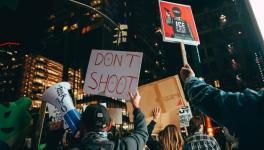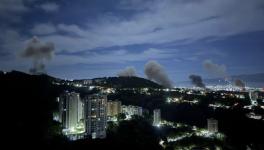UN Security Council Isolates the US on Jerusalem
Vijay Prashad is the Executive Director of the Tricontinental Institute for Social Research and is also chief editor of LeftWord Books. Vija He is the author of over 18 books among them The Death of a Nation and the Future of the Arab Revolution (University of California Press, 2016).
Transcript
SHARMINI PERIES: It's The Real News Network. I'm Sharmini Peries coming to you from Baltimore. The United Nations Security Council voted 14 to 1 to rebuke the Trump administration's decision to move the US embassy in Israel to Jerusalem. The US was the only country to vote against the resolution and since the US has a veto on the Security Council, the vote did not pass. Here are some of the proceedings of the Security Council just before the vote took place and US Ambassador at the UN Nikki Haley's comments shortly after the vote.
NIKKI HALEY: I can say with complete confidence that the United States would vote no. We would exercise our veto power. The reasons why are very relevant to the cause of peace in the Middle East. Given the chance today, the United States would veto Resolution 2334 for another reason. It gave new life to an ugly creation of the Human Rights Council, the database of companies operating in Jewish communities. This is an effort to create a blacklist, plain and simple. The United States refuses to accept the double standard that says we are not impartial when we stand by the will of the American people by moving our US embassy, but somehow the United Nations is a neutral party when it consistently singles out Israel for condemnation.
SHARMINI PERIES: On to talk about this with me is Vijay Prashad. He is the editor in chief of Leftward Books. He is the author of many books, among them, The Death of a Nation and The Future of the Arab Revolution. Thanks for joining me, Vijay.
VIJAY PRASHAD: Thanks a lot.
SHARMINI PERIES: Alright, Vijay. Let's start with your reaction to Nikki Haley, the US ambassador to the UN, her comments we just ran.
VIJAY PRASHAD: It's important to point out that this was a 14 to 1 vote in the UN Security Council, where staunch American allies Britain, France and others voted against the United States' interests and forced the United States to veto the resolution. There were about four positions that the world community took on this matter of shifting the US embassy to Jerusalem, changing the status in other words of Jerusalem unilaterally. The first was I think articulated by the Chinese, who said that this is a sensitive issue, in other words the Israel-Palestine issue, and it should not be inflamed by actions taken by the United States unilaterally.
The second I think important point made was that this goes against a long history of UN Security Council resolutions going back to Resolution 252 from 1968 and then again Resolution 476 from 1980, which directly rebuked the Israeli government's attempt to take Jerusalem as its capital. This 1980 resolution, in particular, was very sharp. This is Resolution 476.
The third issue that was raised by the countries, particularly by US allies United States, France and others, was the question that Jerusalem is part of the final status negotiations and shouldn't be unilaterally decided upon before the Israelis and Palestinians are further along in their discussion and their deliberations.
The final issue raised by a number of non-veto-wielding powers such as Ethiopia, Senegal, etc., was that Jerusalem is the capital of three major religions in the world, Christianity, Judaism and Islam. And that no move should be made that prejudices any religion to have access to the holy sites in the city of Jerusalem. These were the four, I think, quite principled reasons why the world decided to vote against Donald Trump's action from December 6. It's unfortunate that the United States, rather than merely abstaining and allowing this rebuke to go through, decided to veto it. This is taking on the world and isolating the United States which may not be a very bad thing in itself, but I think it simply inflames the situation on the ground in Palestine.
SHARMINI PERIES: Vijay, give us some context to this resolution. How did it come about? Why is the Security Council dealing with it? Who drafted it? Who brought it forward? Given that the United States knew that this resolution would be defeated at the Security Council level, why did they let it come to the floor?
VIJAY PRASHAD: After Mr. Trump made his statement on December 6, there was already a great deal of despair in the world's capitals, saying that this move is going to make any form of peace negotiations difficult. In fact, even staunch US allies such as Saudi Arabia turned their noses up on this particular action by the Trump administration. For a long time, we haven't seen any unity between Iran and Saudi Arabia and on this issue both of them took the same position. Trump had the, let us say, ability to draw together two enemies in the region and make them take the same position against his view.
It just turned out that on the council for this sequence was Egypt. Egypt, again a close ally of Saudi Arabia, drafted the resolution. It's got to be said that these Arab states are under immense pressure from their populations to not allow any unilateral move by the United States to give Jerusalem, as it were, to Israel. Under immense pressure from its own population, the government of Egypt drafted this resolution. It was backed entirely by most of the Arab states. They are not at the council itself, but they backed this resolution fully and it didn't take much backdoor diplomacy to get the other members to agree. As I said, there are sufficient and complex grounds, including the history of the council vis-a-vis Jerusalem, particularly Resolution 476 from 1980, that gave the Egyptian draft resolution a great deal of heft.
I think it was left to Nikki Haley to carry a very poor, very light brief into the council. Again, I'd like to point out that this council meeting lasted for only an hour and a half. This was not a prolonged session. It started just after noon and it ended at about 1:30.
SHARMINI PERIES: I understand that anything related to Palestine right now is very contentious at the United Nations and that Palestine is actually proposing to bring this resolution to the floor of the General Assembly since it was defeated at the Security Council because of the US veto power. If it comes to the floor of the General Assembly, do you think it will be defeated there?
VIJAY PRASHAD: It's an entirely political move on the part of the Palestinians and I think they have every right and perhaps should go to the General Assembly. It's a sort of international referendum on the unilateral action taken by the United States, but I would like to also point out that not half an hour after Mr. Trump made his statement on December 6 about moving the US embassy to Jerusalem, he signed the waiver that allows the US embassy to operate from Tel Aviv. It appears that even inside the Trump White House, there's incoherence on this. It appears that Mr. Trump enjoys making these spectacular gestures, kicking dust in the eyes of the world but it doesn't entirely appear that he's being serious about this because after all he did sign the waiver and the US embassy will continue to function from Tel Aviv.
SHARMINI PERIES: Alright, Vijay. Finally, let me still ask you about the viability of this bill at the General Assembly.
VIJAY PRASHAD: I very much doubt that it will be defeated in the General Assembly. I think it will be a majority vote. After all, when resolutions come before the General Assembly on questions of Israel, they run something like 180 or 185 take the position against one of Israel's asymmetric wars, and a handful of countries vote against it, the United States, Israel itself, and one or two other countries, mainly countries in the South Sea Islands that vote with the United States quite habitually. So, I think that will be the kind of vote that we'll see in the General Assembly. It'll be an entirely political vote. It's not a binding resolution in any way. It doesn't carry much weight but it I think should explain to people in the United States that US policy on Israel is utterly out of step with world opinion.
SHARMINI PERIES: Alright, Vijay. As always, I thank you so much for joining us today.
VIJAY PRASHAD: Thanks a lot.
SHARMINI PERIES: Thank you for joining us here on The Real News Network.
Get the latest reports & analysis with people's perspective on Protests, movements & deep analytical videos, discussions of the current affairs in your Telegram app. Subscribe to NewsClick's Telegram channel & get Real-Time updates on stories, as they get published on our website.























